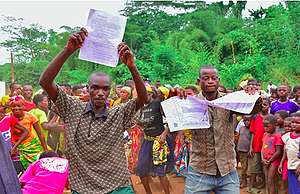March 2019, almost a year after the indigenous people from Lokolama village in the Equateur province filed their application for a forest concession, I went back there to celebrate with them the official allocation of more than 11,000 hectares of forests to them by local authorities.

The story began in 2016, when the indigenous people of this village launched their community forestry project, supported by Greenpeace Africa and the Turing Foundation. The goal was to secure their forest areas by officially obtaining a community forest concession and to support them in managing the forest, including implementation of non-destructive activities which would also improve their livelihood.
Faced with contempt and stigmatisation by Bantu communities, the indigenous people from Lokolama quickly realized that getting ownership was a good opportunity to reverse this trend. Finally, the indigenous people from Lokolama have become the first in the Democratic Republic of Congo to obtain a forest concession. This has been a source of joy and pride for them and a message of encouragement to other Indigenous people that it is also possible for indigenous people to get legal rights to their forest areas.
The long way to community forestry
Before the forest code reform in 2002, it was only the logging industry that could claim the right to legal titles on forests. In the same year, the DRC government yield to pressure by civil society and included in the forest code the possibility for communities to also obtain legal titles to their forest.
The communities only had merely a customary recognition, insufficient in the face of competition from industrial lobbyists. Many communities have been deprived of their customary lands and witnessed the destruction of their precious forests. They have signed agreements with these forest companies, which have proven to be false promises which threw them into abject misery. These agreements have provoked numerous social conflicts.
By allocating forest concessions to communities, the state seems to be taking a step towards restoring social justice between all the users of the forest. The communities can now decide on what activities to implement, how they should organize themselves, and how to improve their livelihoods and distribute the benefits from exploiting their forest.
As indigenous people from Lokolama village call for assistance, public funding is slow in coming
At the official ceremony held last March to deliver the decree for the forest concession, the traditional chief and Lokolama village customary representative, Mr. Joseph Bonkile, requested financial support from other partners so they may develop activities in their concession and protect it. The same message was relayed to the Congolese government by Mr. Valentin Engobo, President of the Association of Lokolama Pygmy Indigenous Peoples.
In a national strategy document related to community forestry signed in 2018, the DRC government committed to allocate 50 forest concessions to local communities and indigenous peoples by 2023. This represents at least 2,465,000 hectares of forest area. To ensure the sustainable management of these concessions, the Congolese State has also committed to approve at least 50 simple management plans for the same period, for the areas to be allocated to the communities.
The state’s role should be broader. It should ultimately make the funding of this community forestry process effective. Unfortunately, I see all community projects currently being implemented exclusively funded by national and international civil society organizations. The lack of governmental financial support the communities can not be justified.
In 2016, the DRC signed in the framework of the Central African Forest Initiative (CAFI), a financing agreement with a group of international donors led by Norway. The framework will provide the DRC with 200 million USD by 2020 to put in place programs to reduce emissions from deforestation and forest degradation (REDD+). Instead of favouring a controversial program which aims to provide financial support to the industrial forest sector, and whose activities continue to cause environmental, social and economic damage by degrading forests, the DRC government should do better to devote a large part of CAFI funds to community projects.
I am convinced that the best way to ensure local economic growth while protecting forests, is to strengthen the DRC’s commitment to supporting community-based solutions such as community forestry. That is one of the sustainable alternatives to industrial exploitation.
Serge Sabin Ngwato is a Greenpeace Africa forest campaigner basée en DRC
